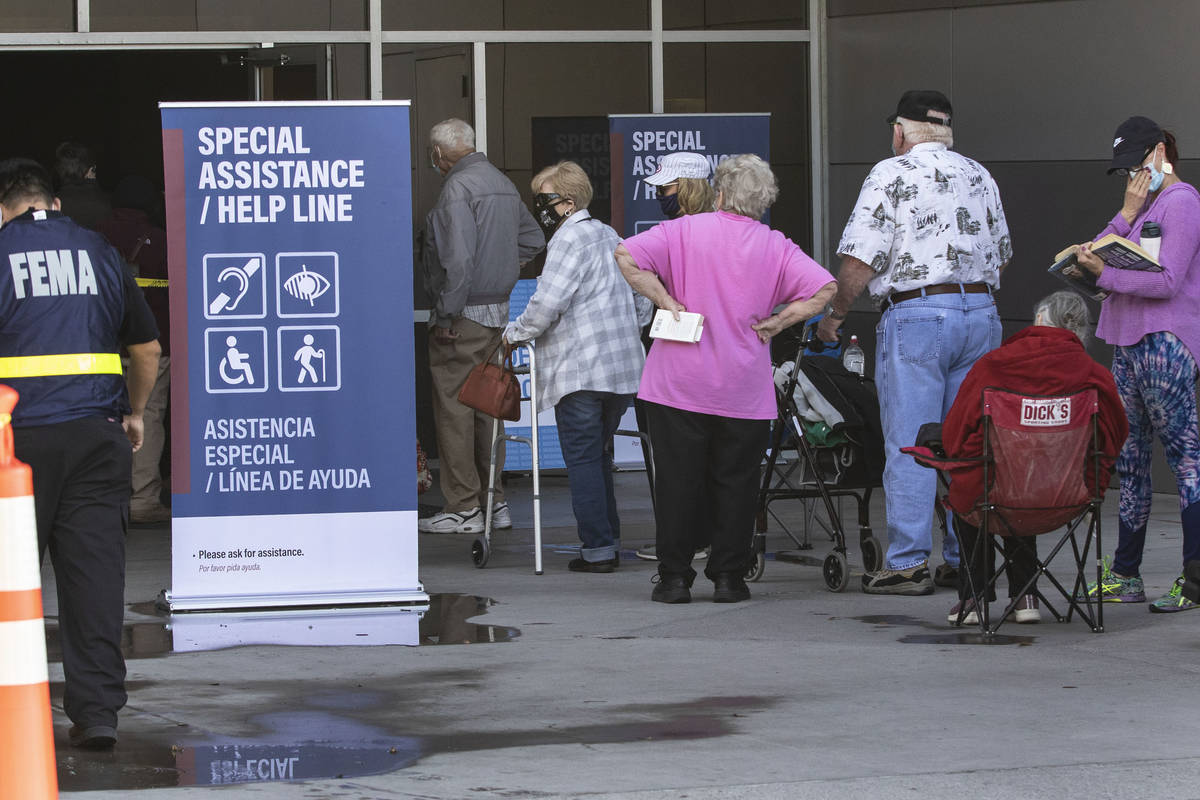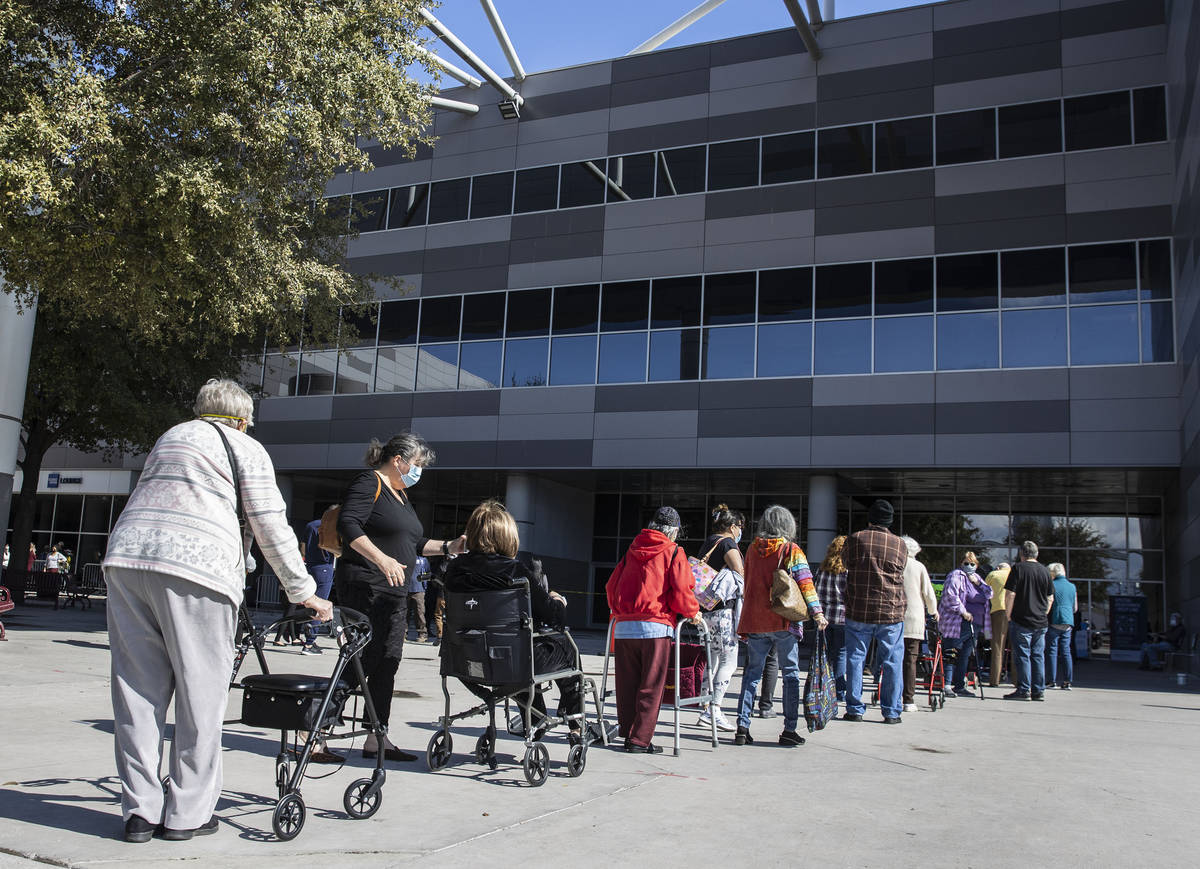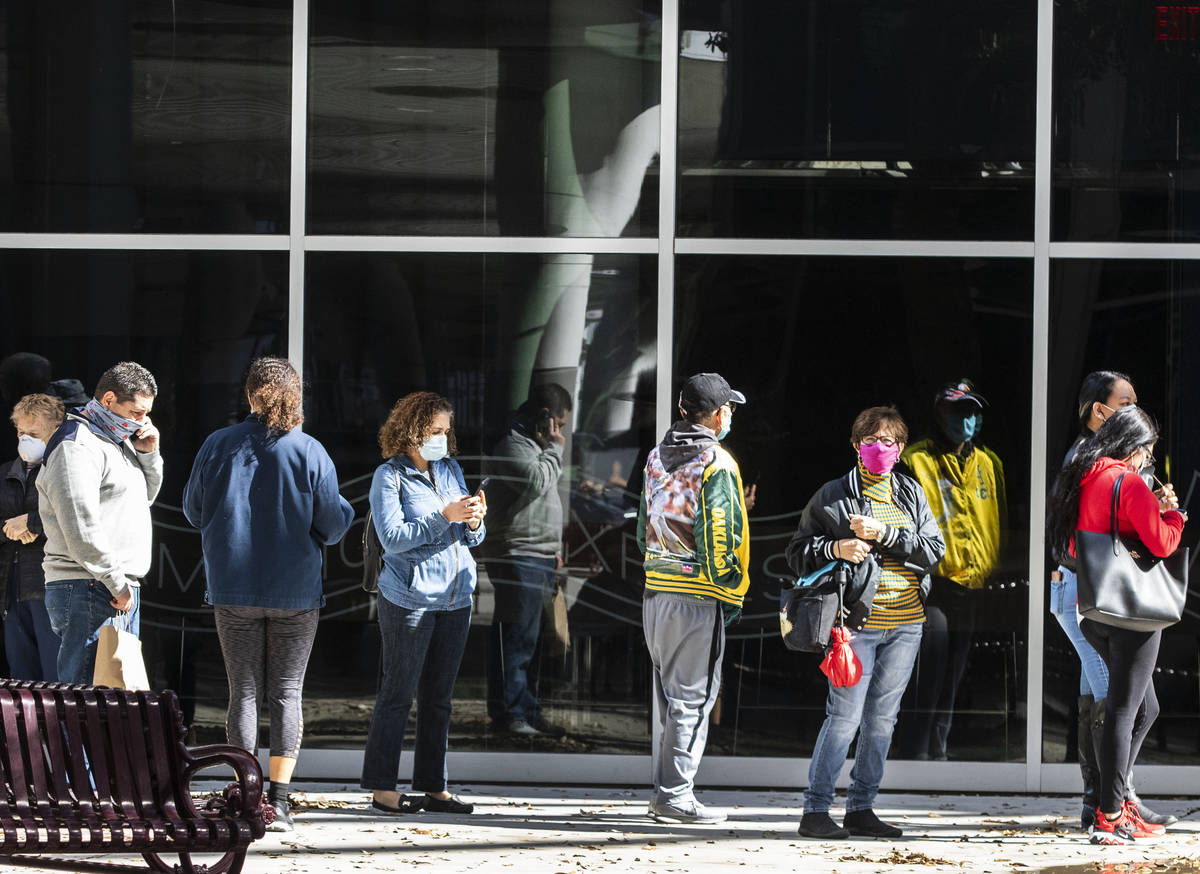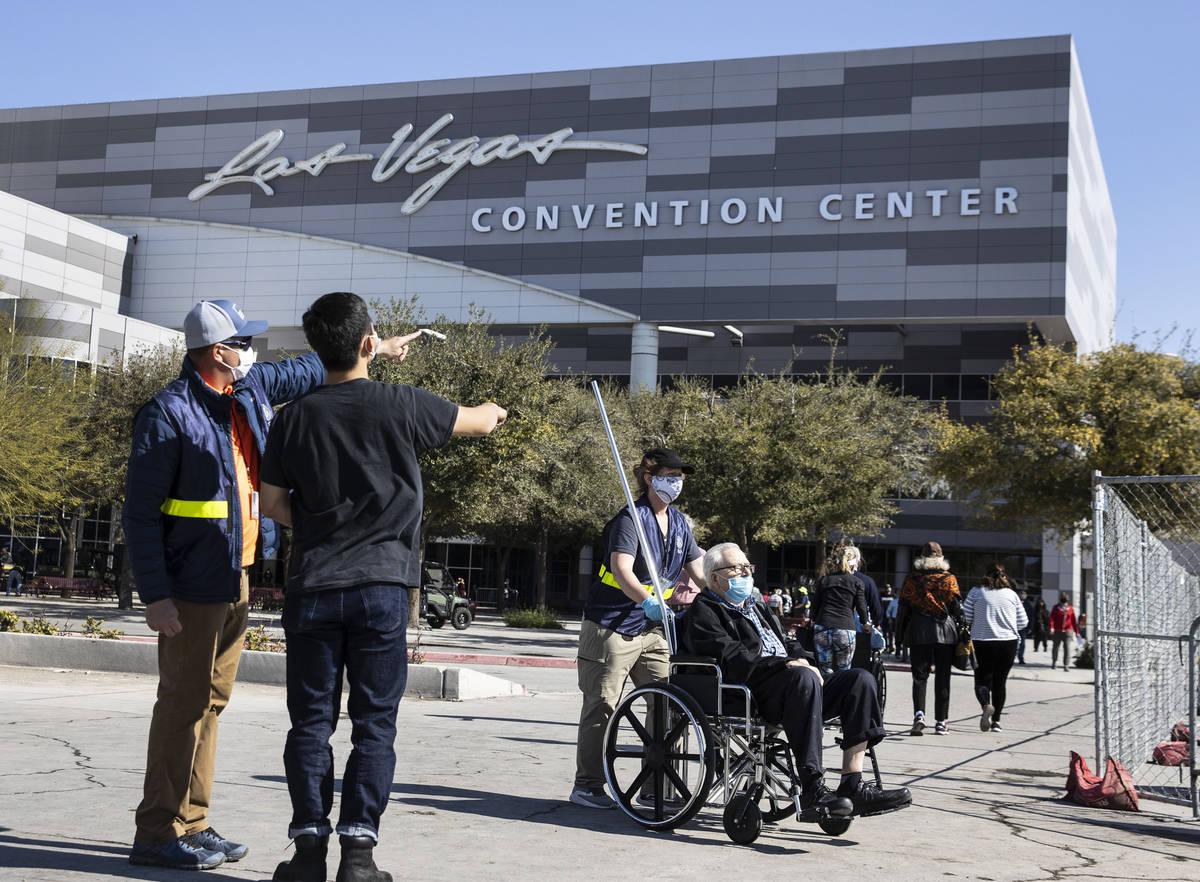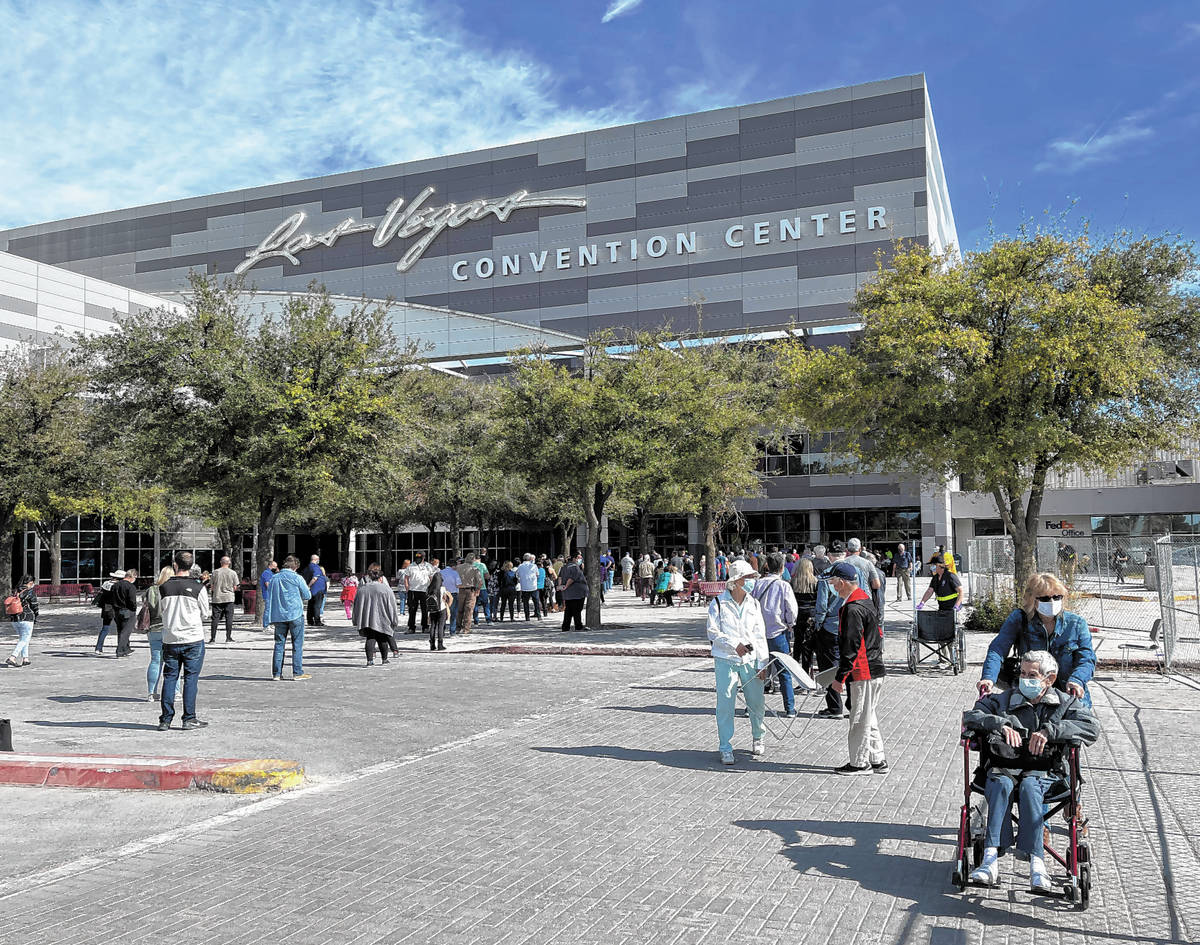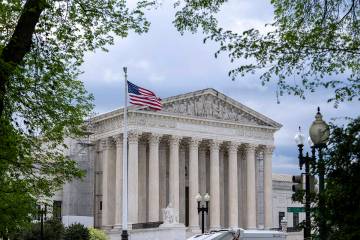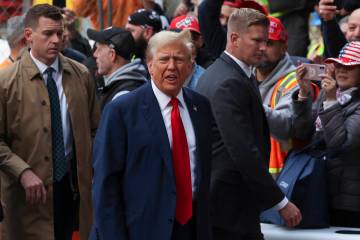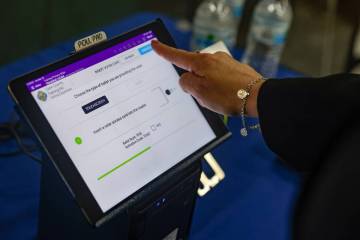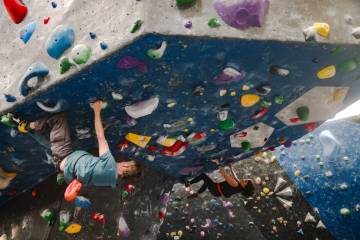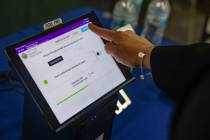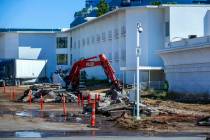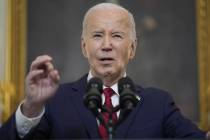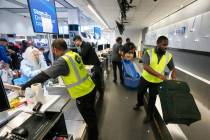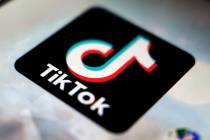Vaccines hard to come by? Not for Southern Nevada government workers
Thousands of Southern Nevada government employees, including some who are working remotely, have been offered COVID-19 vaccines that are frustratingly difficult for many older residents to secure and off limits still to many of the state’s elders.
Nevada is among the roughly one-third of states where the potentially life-saving vaccine has not yet been offered to those 65 to 69. Even eligible locals 70 years and older have found themselves discouraged by the rollout, with appointments hard to come by for doses in short supply.
Local government officials say that distribution to municipal and county workers is guided by criteria set forth in the state’s “playbook” on vaccination distribution. When it was revised last month, the playbook put front-line essential workers on a concurrent path for immunizations with older Nevadans.
“We’re trying to get it in the people that are most desperately required to have it as soon as possible,” Gov. Steve Sisolak said Thursday about the intent of the so-called two-lane rollout.
But Shirley Brice, a 66-year-old Henderson resident with two heart conditions, said, “Why isn’t Nevada pulling the trigger on 65-plus? If we want to prevent people dying from this, it seems like age should be one of the first things to consider.”
In Nevada, 64 percent of deaths from COVID-19 have been in those 70 and older, and 20 percent in those 60 to 69, according to state data.
‘Continuity of governance’
In Clark County, certain government employees can qualify for the vaccine now under an occupational priority group called “continuity of governance,” which according to the playbook includes state, local and other elected officials and support staff such as the Legislative Counsel Bureau. It does not specify what other staff might be eligible.
But mere inclusion in the category does not mean that a worker should automatically receive doses.
The playbook states that any employee who can work remotely or socially distant while performing their duties is not recommended to receive a vaccine right now. Instead each government is given the discretion to decide whether that employee truly cannot avoid close and prolonged contact with others, seeking to conserve limited vaccine allocations for individuals facing higher risk.
Still, doses have been offered to every employee in the city of Las Vegas and Clark County, most workers in the city of Henderson and at least half of the workforce in North Las Vegas, although not all workers have accepted their chance to get a shot, local government officials said this week.
“I think at this point, we’re just trying to get (the vaccines) out there, and all our employees are dealing with the public,” said county Commissioner Tick Segerblom, who also sits on the Southern Nevada Health District board. “If one of our employees goes down, then that affects a bunch of other people.”
Officials underscored that more workers than usual are on the front lines during the pandemic as they get pulled into new public-facing roles to assist with the response to the crisis.
In the city of Las Vegas, where more than 1,300 of some 2,700 employees have received a first vaccine dose as of Feb. 5, the availability of immunizations, coupled with a decline in local coronavirus cases, informed the city’s decision to eye returning employees to full-time, in-person work on March 15, according to city officials.
‘Pushing to the front of the line’
But New York University medical ethicist Arthur Caplan described the approach of giving priority to so many in government as “just a version of pushing to the front of the line,” saying that continuity of government was simply a pretense that “has nothing to do with trying to protect people who are legitimately at risk.”
Many in government perform functions that can and should be done remotely while vaccine is scarce, with the limited supplies reserved for essential workers truly on the front lines, said Caplan, director of the Division of Medical Ethics at the Grossman School of Medicine.
“Government officials should do better in terms of trying to follow health recommendations,” he said.
In Henderson, more than 1,000 of the city’s 3,082 full- and part-time employees have received a first dose of vaccine, spokeswoman Kathleen Richards said Tuesday. The city deemed some workers ineligible under the playbook but offered the vaccine to most, including some working remotely, she said.
About 360 Las Vegas employees offered a dose have been working alternately from home and the office to limit the number of people in the workplace on any given day, according to city spokesman David Riggleman.
All 10,000-plus Clark County employees were offered the opportunity to be vaccinated, according to spokesman Dan Kulin, who said the county did not track how many actually received it. Segerblom said he was not certain how many employees might be working remotely.
In North Las Vegas, roughly 700 employees — or about half of the city’s workforce — who generally interact with colleagues or with the public have received at least a first dose, said spokesman Patrick Walker. He did not specify how many employees were offered a dose.
“I think there is justification for a large-scale public employee vaccination, largely due to the work that they do,” said North Las Vegas City Councilman Scott Black, who is also the chair of the health district board.
The practice is not limited to municipalities and counties.
The Clark County School District has offered vaccinations to all 42,000 of its teachers and staff, though it remains unclear how many will be returning to actual classrooms this school year, when teaching so far has been done online.
Responsibility for verifying eligibility
The Southern Nevada Health District provides doses to the governments and recommends that they follow the state playbook but does not approve their rollout plans, Chief Health Officer Dr. Fermin Leguen said Wednesday.
The district assists the governments with any questions they might have about administering the vaccine to its employees, he added.
When asked Thursday if giving broad vaccine access to local government employees aligned with the intent of the playbook, Sisolak said that the burden for ensuring eligibility fell on health districts. He also said that individuals should take personal responsibility to follow the rules.
“I’m not standing in one of the vaccination lines asking to see people’s ID and where they work,” the governor said.
In response, Leguen said in a statement Friday that because the health district “does not know the operations of each jurisdiction and the different responsibilities of their employees,” it is up to each government to responsibly provide access to the vaccine.
Local governments began providing vaccines to employees in phases last month, progressing from public safety workers to emergency operations staff, and then to the front-line, essential workers, local government officials said.
But Las Vegas Councilwoman Olivia Diaz noted that city office employees have been asked to staff an isolation and quarantine complex for the homeless and act as ambassadors to ensure businesses were complying with state rules, while park and maintenance squads have had to routinely sanitize city parks.
“I feel that we are front-line workers here at the city,” said Diaz, who also sits on the health district board.
The health district has administered roughly 450 doses to its 680-person workforce for a similar reason, since employees can be assigned to roles such as staffing testing and vaccination clinics, said spokeswoman Jennifer Sizemore.
Still, ethicists question the fairness of the vaccine rollout if members of the public face barriers that government workers do not.
UNLV bioethicist Johan Bester has seen close up the difficulty members of the public face in determining when they are eligible for the vaccine and then in navigating online systems for making scarce appointments.
It is unfair when “people who are inside the distribution system, government officials and so on, … face less barriers and it’s easier for them to access the vaccine,” said Bester, an assistant professor and director of bioethics at the UNLV School of Medicine.
Many government workers also avoid the circuitous public scheduling system and long lines at public vaccination clinics. For instance, Las Vegas employees have been able to get vaccinated at the city’s Emergency Operations Center, according to the city. In Henderson, some employees received the vaccine through a partnership with Community Ambulance at their main office, while others went to locations open to front-line and essential workers throughout the valley, Richards said.
As officials seek to strike a balance between saving lives and supporting the functions needed to keep society running, Bester said, more should be done to inform the public about the prioritization groups and allow stakeholders to give their opinions.
“I’m thinking of … the 70-year-old senior citizen, alone at home with nobody to help him work the computer, who doesn’t know where to go,” Bester said. “Somebody like that, just because they’re not connected to the system, shouldn’t face barriers to vaccine access.”
‘Something’s wrong with this picture’
Sixty-nine-year-old Jane Law, who works as a nanny, tried to make an appointment through the health district’s website, which she said was like “trying to get a ticket to a Paul McCartney concert.”
When she went to an appointment her son scheduled at Western High School, she observed that most people were middle-aged, with some as young as their 20s.
“I thought, ‘Something’s wrong with this picture,’” she said.
Law thought she would be eligible to get a shot at the clinic, which was vaccinating eligible front-line essential workers including those in child care. Despite producing her paystubs, she was turned away because she did not work for a child-care business.
“My vial either went to waste or was given to whoever just stood outside at the end of the day,” she said. “That’s what makes it so absurd.”
According to the AARP, at least 32 states already offer vaccine to those 65 to 69 years old, while additional states offer shots to those with health conditions that put them at high risk for complications from COVID-19.
It remains unclear when vaccine will become widely available to this age group in Nevada. According to data on the health district’s website, 43 percent of vaccine in Clark County has gone to those 70 and older.
Brice, the Henderson woman with a bad heart, takes no issue with medical workers and certain other front-line essential workers being at the front of the line. “But it seems like it’s gotten … a little bit out of control,” with shots being given to young people who work from home.
“I’ve got a plastic device in my heart. I had heart surgery three years ago. So I am petrified to step outside,” she said. “And I am just waiting very impatiently at this point to be able to get my shot in Nevada.”
Contact Shea Johnson at sjohnson@reviewjournal.com or 702-383-0272. Follow @Shea_LVRJ on Twitter. Contact Mary Hynes at mhynes@reviewjournal.com. Follow @MaryHynes1 on Twitter. Review-Journal staff writer Blake Apgar contributed to this report.
Related
Can pop-up sites bring vaccine equity to hard-hit neighborhoods?



